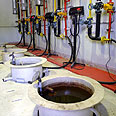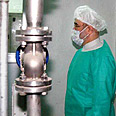

The U.N. nuclear watchdog said Friday questions remained about Iran's atomic programme and confirmed Tehran had resumed activities suspended under a deal with the European Union.
It now sets the stage for Iran's possible referral to the U.N. Security Council for sanctions.
The confidential report of the International Atomic Energy Agency (IAEA), obtained by Reuters, said the agency was "still not in a position to conclude that there are no undeclared nuclear materials or activities in Iran".
The report, penned by IAEA chief Mohamed ElBaradei, said, "In view of the fact that the agency is not yet in a position to clarify some of the important outstanding issues after 2-1/2 years of intensive inspections and investigation, Iran's full transparency is indispensable and overdue."
Iran, which denies wanting nuclear weapons as suspected by Washington and the European Union, says it has answered almost all of the IAEA's questions and shown its atomic ambitions are limited to harnessing nuclear power to generate electricity.
However, the E.U.was angered by Iran resuming uranium processing work last month at a plant in Isfahan - a move which brought talks between Iran and the E.U. close to collapse and led EU officials to threaten the Security Council referral.
The report said that since resuming work at Isfahan, Iran had produced seven tons of gas used for uranium enrichment, enough for a nuclear bomb if was purified into highly enriched form.
It said Iran had fed four tons of raw uranium into the plant to prepare for enrichment, a process of purifying uranium for use as fuel in atomic power plants or bombs.
"The whole (Isfahan plant) is operating," a senior official close to the IAEA said about the agency's findings.
Security council referral?
Confirmation that Iran refused to resume the suspension, which was the cornerstone of a deal in November with France, Britain and Germany, will likely prompt the E.U. to join Washington in pushing for Iran's case to be referred to the Security Council for punitive action, E.U. diplomats said.
"There's nothing in this report that's likely to alter the European view that a report to the Security Council will be necessary unless Iran re-suspends all activities at Isfahan," one European diplomat said on condition of anonymity.
After two years of negotiations, the E.U. trio last month offered Iran economic and political incentives if Tehran gave up all work related to the production of nuclear fuel.
However, Iran rejected the offer and restarted Isfahan.
Iran: IAEA report "positive and negative"
Iran's chief nuclear negotiator, Ali Larijani, told state television the report had "positive and negative points".
"Because of Iran's close cooperation with the agency ... Fortunately many of the questions have been answered from a legal and technical point of view," he said.
"There are some minor questions remaining and our cooperation with the agency will continue in order to answer those questions," he said, adding that the harsher comments were the result of U.S. pressure on the IAEA.
The IAEA report said it appeared very likely that Iran's explanation for traces of highly enriched uranium particles found in the country were from centrifuges shipped from Pakistan rather than the result of development work done by Iran.
However, it also said there were still some particles whose origin had not been accounted for.
The report said the agency still had questions regarding Iran's contacts with a clandestine network linked to Pakistani nuclear scientist Abdul Qadeer Khan, the father of Pakistan's atom bomb program.















